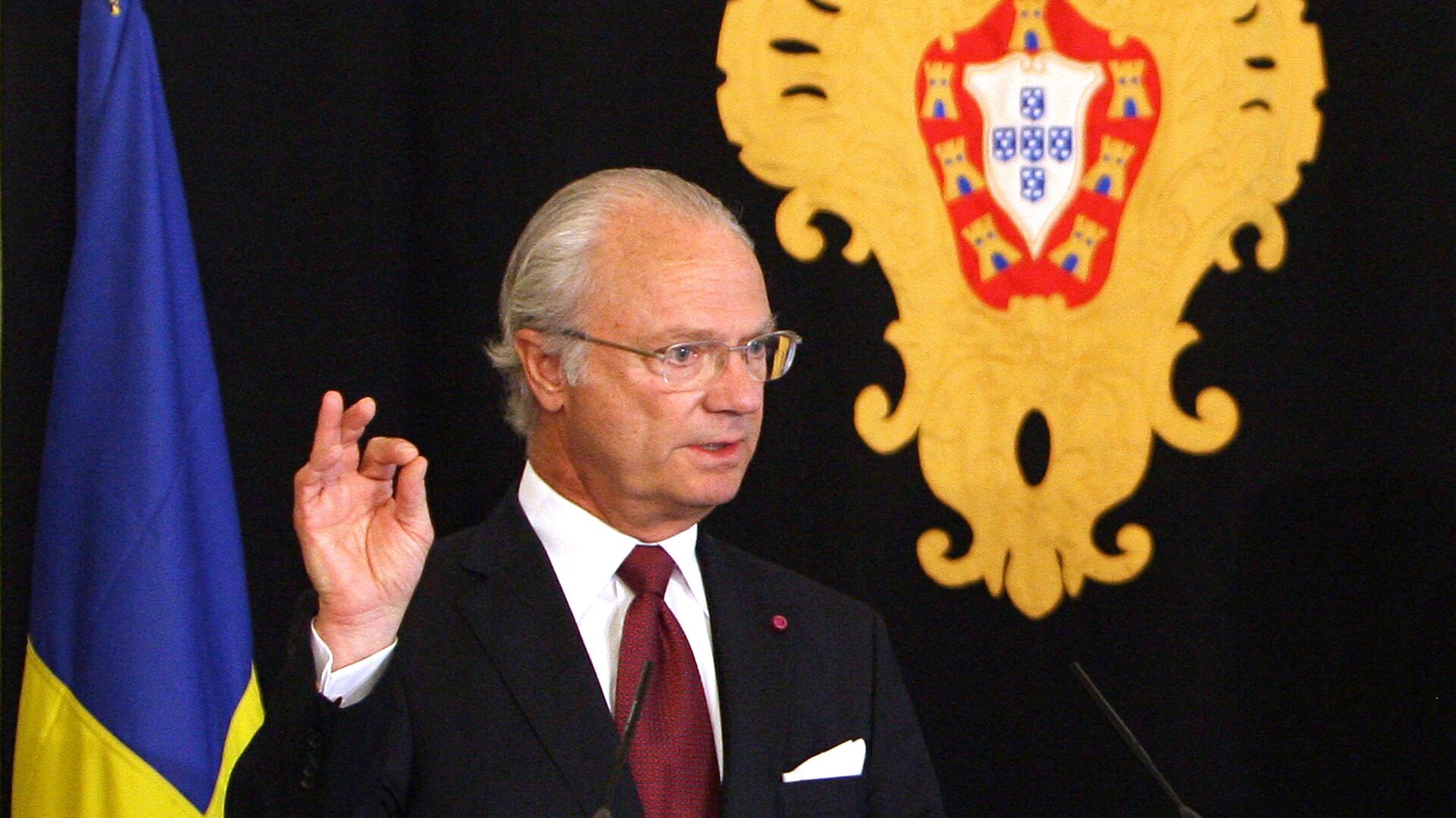https://sputnikglobe.com/20230105/unfair-king-of-sweden-claims-his-son-should-be-heir-1106050510.html
‘Unfair’: King of Sweden Claims His Son Should Be Heir
‘Unfair’: King of Sweden Claims His Son Should Be Heir
Sputnik International
King Carl XVI Gustaf has objected the retroactive law that stripped his son Carl Philip of the title Crown Prince he held upon his birth.
2023-01-05T05:58+0000
2023-01-05T05:58+0000
2023-01-05T05:58+0000
world
sweden
monarchy
royal family
news
europe
https://cdn1.img.sputnikglobe.com/img/103864/95/1038649536_0:392:2500:1798_1920x0_80_0_0_a2b6e957a2c14109d50a041a09e2cb9a.jpg
King Carl XVI Gustaf of Sweden has once again slammed the law of absolute primogeniture that was introduced in 1980 and made retrospective.King Carl XVI Gustaf objected against the law’s retroactive nature, arguing that his son Carl Philip should not have been stripped of the title Crown Prince he held upon his birth.After the interview concluded, the reporters were called back so that His Majesty could clarify his remarks.“I said that, and it’s clear I can’t. With the benefit of hindsight we have to take a look at how a constitution can work retroactively,” Gustaf of Sweden said. “A Prince was born as the Crown Prince. Months later a decision was made, saying there are new conditions. But I think he has taken it well. I haven’t perceived any problems between the siblings, they get along well with each other.”He furthermore called 45-year-old Crown Princess Victoria, heir apparent to the Swedish throne, “very committed,” adding that she “feels the responsibility” despite still being a “young woman.” If she ascends to the throne as expected, she would be Sweden's only fourth queen regnant (after Margaret, Christina and Ulrika Eleonora) and the first since 1720.In 1979, the Swedish legislative body introduced a constitutional amendment meaning the throne would be inherited by the monarch’s eldest child regardless of gender, becoming the first country in Western Europe to legally adopt absolute primogeniture.Prior to January 1, 1980, Prince Carl Philip was heir to the throne, despite having an elder sister. Since the law was retrospective, Victoria was made Crown Princess, with Carl Philip only being Crown Prince for seven months.At the age of 76, Carl XVI Gustaf is the longest-reigning monarch in Swedish history, having taken the throne in 1973. Meanwhile, the King of Sweden is no stranger to controversy. Back in 1980, he claimed that the job of regent was “too heavy for a girl.” Carl Gustaf himself became king despite being the youngest in a group of five siblings. All of his older siblings are female.In 2020, the king caused a stir with his critical statements about the Swedish government's handling of the COVID-19 pandemic. Critics meant he crossed the line for how political a monarch may become.
sweden
Sputnik International
feedback@sputniknews.com
+74956456601
MIA „Rossiya Segodnya“
2023
News
en_EN
Sputnik International
feedback@sputniknews.com
+74956456601
MIA „Rossiya Segodnya“
Sputnik International
feedback@sputniknews.com
+74956456601
MIA „Rossiya Segodnya“
absolute primogeniture, swedish monarchy, swedish royal house, carl xvi gustaf, crown princess victoria
absolute primogeniture, swedish monarchy, swedish royal house, carl xvi gustaf, crown princess victoria
‘Unfair’: King of Sweden Claims His Son Should Be Heir
In 1979, Sweden introduced a constitutional amendment implying the throne would be inherited by the monarch’s eldest child regardless of gender, becoming the first country in Western Europe to legally adopt absolute primogeniture.
King Carl XVI Gustaf of Sweden has once again slammed the law of absolute primogeniture that was introduced in 1980 and made retrospective.
King Carl XVI Gustaf objected against the law’s retroactive nature, arguing that his son Carl Philip should not have been stripped of the title Crown Prince he held upon his birth.
“It’s tricky to have laws that work retroactively. It doesn’t seem wise. You can accept the next generation, that’s okay. But it was my son who was born, and they changed quite a lot, and he lost it all. It’s quite strange. You can’t do that,” the 76-year-old monarch said in an interview to mark the start of his Golden Jubilee year. “Unfair? Yes, I think so,” he added.
After the interview concluded, the reporters were called back so that His Majesty could clarify his remarks.
“I said that, and it’s clear I can’t. With the benefit of hindsight we have to take a look at how a constitution can work retroactively,” Gustaf of Sweden said. “A Prince was born as the Crown Prince. Months later a decision was made, saying there are new conditions. But I think he has taken it well. I haven’t perceived any problems between the siblings, they get along well with each other.”
He furthermore called 45-year-old Crown Princess Victoria, heir apparent to the Swedish throne, “very committed,” adding that she “feels the responsibility” despite still being a “young woman.” If she ascends to the throne as expected, she would be Sweden's only fourth queen regnant (after Margaret, Christina and Ulrika Eleonora) and the first since 1720.
In 1979, the Swedish legislative body introduced a constitutional amendment meaning the throne would be inherited by the monarch’s eldest child regardless of gender, becoming the first country in Western Europe to legally adopt absolute primogeniture.
Prior to January 1, 1980, Prince Carl Philip was heir to the throne, despite having an elder sister. Since the law was retrospective, Victoria was made Crown Princess, with Carl Philip only being Crown Prince for seven months.
At the age of 76, Carl XVI Gustaf is the longest-reigning monarch in Swedish history, having taken the throne in 1973. Meanwhile, the King of Sweden is no stranger to controversy. Back in 1980, he claimed that the job of regent was “too heavy for a girl.” Carl Gustaf himself became king despite being the youngest in a group of five siblings. All of his older siblings are female.
In 2020, the king caused a stir with his critical statements about the Swedish government's handling of the COVID-19 pandemic. Critics meant he crossed the line for how political a monarch may become.


